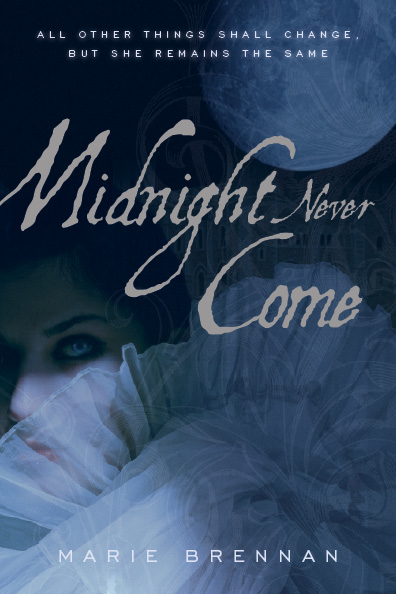Marie Brennan, Midnight Never Come
reviewed by Danielle L. Parker
 Midnight Never Come Publisher: Orbit, 2008 Length: 390 pages ISBN: 978-0-7394-9692-3 |
Perhaps my woods were as magical in their own way, but its stories were never comfortable. I knew that over that hill was a bad-tempered, garbage-weaned grizzly, and that was not the same as meeting a leprechaun. No, the Little Folk never crossed the Atlantic. If I had doubted it, an English friend who has lived in the U. S. for a number of years assured me in all sincerity that she has never sensed the presence of the fairies here. I don’t doubt she misses them.
Of course, I still retain a nostalgic love of fairy tales, particularly the ones that depict the fairies as alluringly dangerous. Just such a book is Midnight Never Come, and since it is set in Elizabethan England, one of the times I might have chosen if offered the chance to play tourist, I couldn’t be happier. John Dee, the original (and there’s nothing like the original) Queen E., and the famous spymaster Sir Francis Walshingham all make appearances. We’re missing Christopher Marlowe, whom I really wanted to see, but at least he gets a mention. You can’t have everything, I suppose.
And of course, there are those dangerous, alluring fae. Unbeknown to the clods of clay tromping London’s less-than-sanitary streets, there is a mirror court below. Queen Gloriana has a dark shadow, the fairy queen Invidiana. Walsingham, Elizabeth’s spymaster, suspects such a hidden influence upon the affairs of his Queen. But no sooner is the suspicion voiced than the spymaster himself dies, and it’s left to young Michael Deven, his loyal agent and newly raised Gentleman Pensioner of the Queen, to ferret out the truth of his master’s death and unravel the mysterious ties between the two courts.
Of course it does not help Deven that his lady love, Anne Montrose, proves to be an agent of sorts herself, possibly for the dark fairy court. Soon, Deven has fallen afoul of the same forces that eliminated Walsingham. Will he free his Queen and find his own true love again? You’ll have to read it to find out.
I can’t resist finishing with a few other recommendations for readers looking for the darker side of the fairy legends. Arthur Machen’s still-chilling classic, The Great God Pan, published in 1894, is a must-read. So, too, is Lord Dunsany’s The King of Elfland’s Daughter, published in 1924. Both books are excellent. There’s always Spenser’s Fairie Queen, of course, but I confess to never managing to finish it. Robert Browning’s wonderful Childe Roland to the Dark Tower Came was more my style in fantastic verse (Stephen King must agree with me). Enjoy!
Copyright © 2008 by Danielle L. Parker

